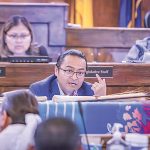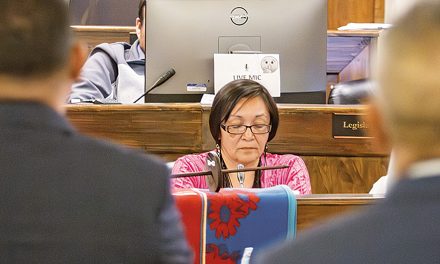
50 years Ago: Move U.S. capital to warmer location, Council delegate says
U.S. District Court Judge Walter Craig in Phoenix has issued a temporary ruling allowing Ted Mitchell back on the Navajo Reservation so he can run DNA-People’s Legal Services from his Window Rock office. Mitchell had been running the legal aid agency from a trailer in Tse Bonito, New Mexico, for the past several months ever since he was banned from the reservation in a dispute with Council Delegate Annie Wauneka, in which she claimed Mitchell disrespected her and the Navajo people. Mitchell filed a federal lawsuit claiming that his rights had been violated under the Indian Civil Rights Act of 1968.
In his ruling, Craig said he was issuing the temporary order until he arrives at a full decision, which he said would come before Feb. 15. Craig said the problem he was having was determine which had more authority in this matter – the Civil Rights Act or the Treaty of 1868, which gave the tribe the right to ban any non-Indian from the reservation who is judged to be a danger to the community. Mitchell claimed that he was no danger to anyone and the members of the Navajo Tribal Council used the treaty right instead of the fact that he was not well-liked by many in the tribal government.
In other news, Navajo Tribal Chairman Raymond Nakai traveled to Phoenix to speak to members of the Kiwanis Club about state legislation that would force Navajos to pay property tax on assets they owned on reservations. Nakai said this legislation was based on the premise that Native Americans were a drag on the state and it was having to pay tens of millions of dollars a year in welfare payments to them. This is not true, said Nakai, who pointed out that reservation residents pay millions of dollars a year from driving licenses and car licenses and in sales tax when they shop off the reservation.
“None of this comes back to the reservation,” he said. Yes, there are a lot of Native Americans in the state who are on welfare and receive some sort of state help but the amount that goes to them is a small portion of the total amount the state pays out in welfare payments each year, he said. He also pointed out that the Navajos have spent $44 million of its own money in the last few years to train Navajos for jobs and that many of them have used this training to get jobs off the reservation and are now paying the state millions of dollars annually in state income taxes.
“You swarm over the reservation with your game wardens to make sure we have Arizona fishing and hunting licenses,” he said, adding that it’s up to the tribe and not the state to make sure the lakes on the reservation are stocked with fish. The bottom line is a fact that few Arizona officials want to admit. Native Americans in the state pay their fair share in taxes and are not a burden on anyone, Nakai said.
Navajo Community College is less than a year old and the Navajo Times decided to do its part to help it succeed. Dick Hardwick, the Times’ managing editor, said the paper will publish a regular column twice a month or so giving readers news about what is going on at the college and promoting its programs. The column is expected to be positive in nature, giving both reservation residents and those from off an idea about what is going on at the college.
Anything that is generally bad about the college would be covered in the regular news columns, which is not to say that there was anything negative published in the Times. The reporters for the paper were hearing complaints from residents in Tsaile, Arizona, about drinking on the campus and some residents were saying that they worried about driving near the campus on Friday and Saturday evenings because of their fear of drunken drivers.
College officials were trying to deal with the problem by scheduling events on campus on weekends to keep students occupied and give them a reason not to travel to border communities. There is even some talk about fielding intramural basketball teams as a way of keeping students occupied at night and on weekends.
And finally, Ned Benally, who represents Kayenta in the Navajo Tribal Council, went to Washington, D.C., earlier this month to attend the inauguration of President Richard Nixon. When he came back, he complained about the cold weather and said he plans to do something about it. He said he was thinking about running for U.S. president in 1972 on the sole platform of moving the U.S. capital to some place warmer, such as Florida. It makes no sense, he said, that people have to be subjected every four years to bitter weather at inaugurations when moving the federal headquarters to a warmer state can solve the problem.
Someone suggested that Phoenix would be an even better location since it is always warm and you would not have to worry about hurricanes, which you would if you moved it to Florida. As for high temperatures in the summer, that would not be a problem since no one works in the summer now. Benally said he and Daniel Peaches, who is also from Kayenta, were invited to attend the inauguration by Sen. Barry Goldwater, R-Ariz., whose family had several trading posts in the western portion of the reservation for decades.
To read the full article, pick up your copy of the Navajo Times at your nearest newsstand Thursday mornings!
Are you a digital subscriber? Read the most recent three weeks of stories by logging in to your online account.








 Highway 264,
Highway 264, I-40, WB @ Winslow
I-40, WB @ Winslow